This post may contain affiliate links. Please read my privacy policy.
One of the most important decisions when making beef jerky is the cut of meat you are going to use. Using the best meat for beef jerky makes all the difference, and here I'll show you what meats are the best!
I also have a video that will explain these cuts in more detail, show you what they look like, and let you know which ones are my favorite! So make sure you check it out.
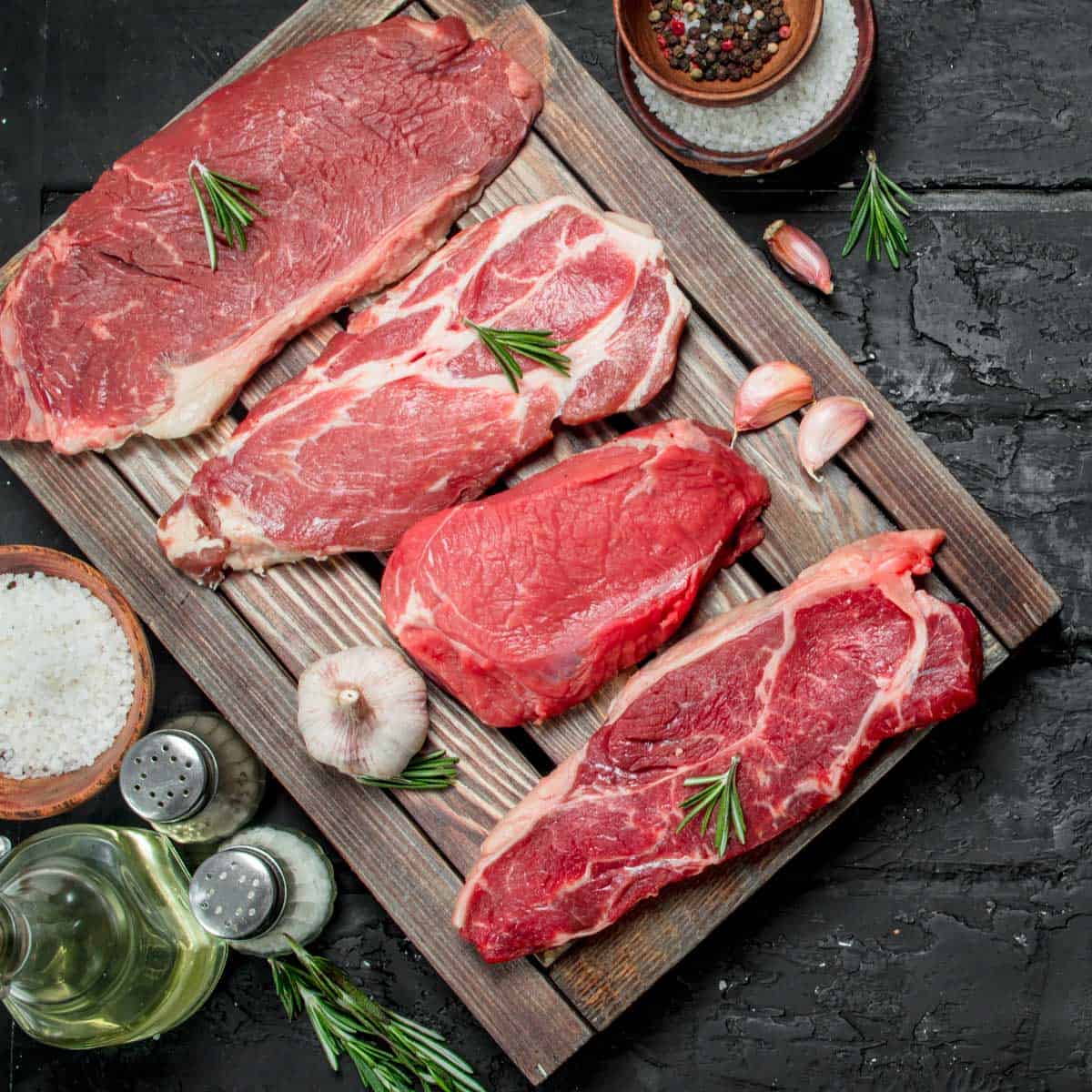
Jump to:
🎥 Video - Best meat for jerky
🥩 What is The Best Cut of Meat?
Beef eye of round, bottom round, and top round are the best meat for beef jerky. Choosing a cut that has very little fat is important, fat will spoil faster and shorten the shelf life of your jerky.
Below is a list of the best cuts of beef for making beef jerky. You can also make beef jerky out of lean ground meat.
Try several different cuts and decide for yourself which one is your favorite! Once you do, check out my Beef Jerky Recipes Page to find your favorite jerky marinade!!!
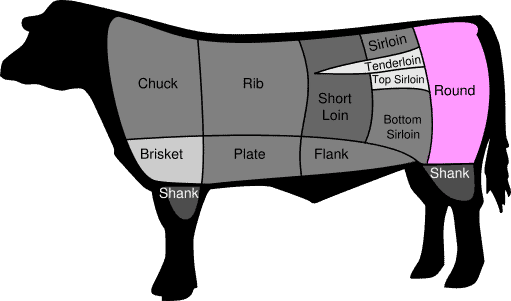
Eye of Round -
Hands down, this is the best meat for beef jerky. The most tender of the Rounds. This is a single oval muscle in the rear leg. This is my go to cut of meat when making beef jerky.
- Lean
- Little interior fat
- Need to trim the fat cap
- Grain runs the length of the cut for easy slicing with or against the grain
- Economical (relatively inexpensive)
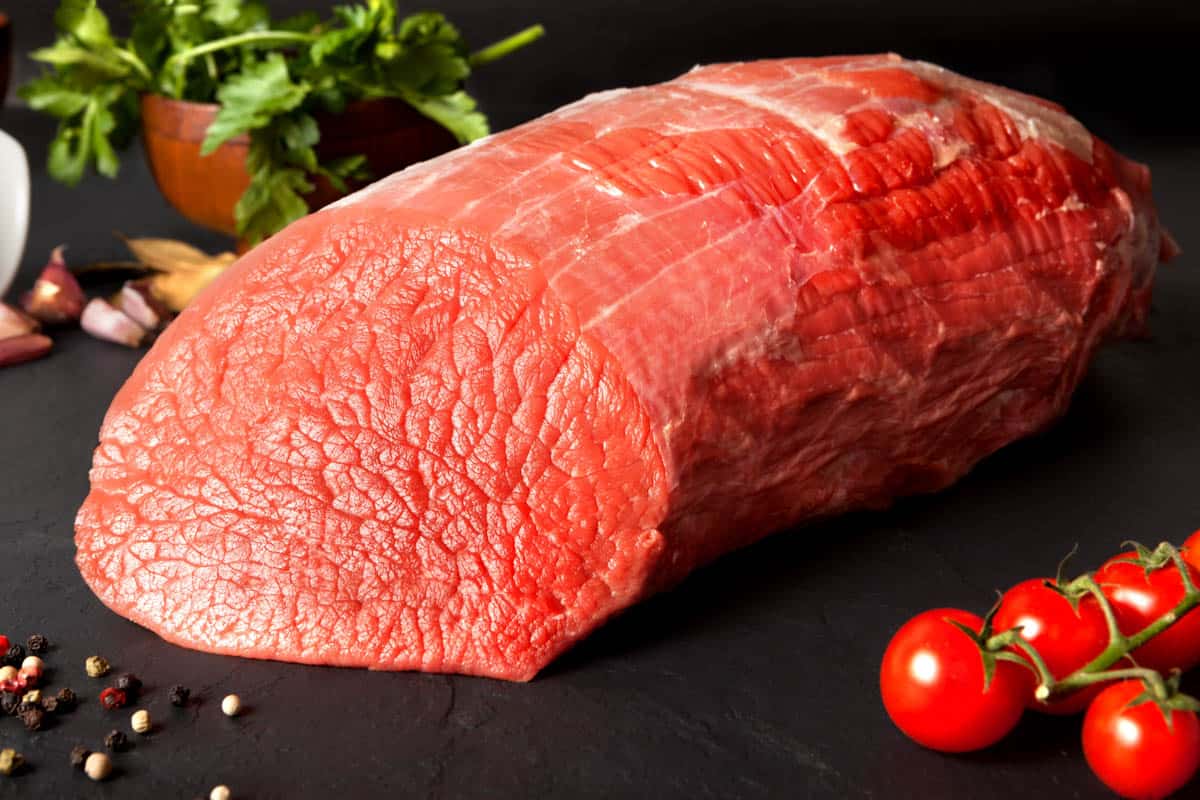
Bottom Round -
Another great choice of meat for making beef jerky. It is the outer muscle of the upper rear leg. This is the least tender of the rounds. Even though it is the least tender, it makes great jerky!
- Lean
- Possible interior marbling
- Flavorful
- Economical (relatively inexpensive)
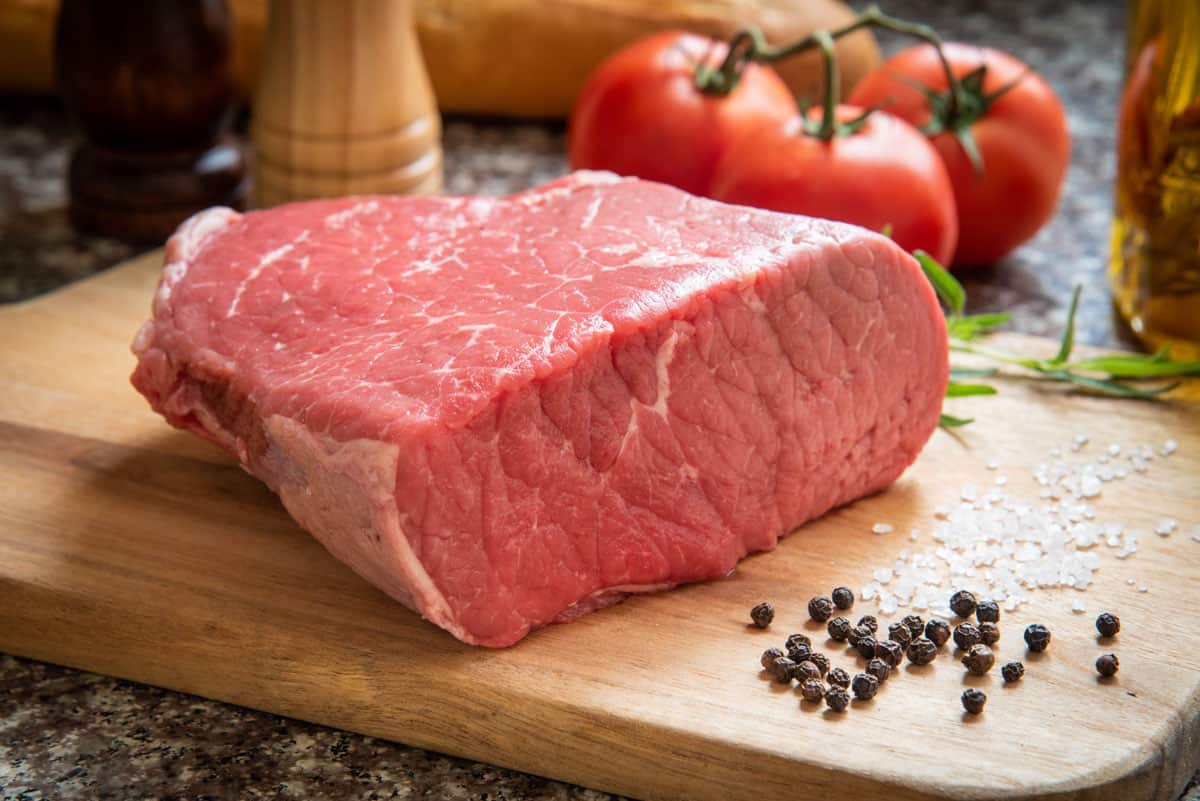
Top Round -
Very similar to bottom round. The top round is cut from the inside leg muscle, opposite of the bottom round. This cut is more tender than the bottom round and less tender than the eye of round.
- Lean
- Flavorful
- Economical (relatively inexpensive)
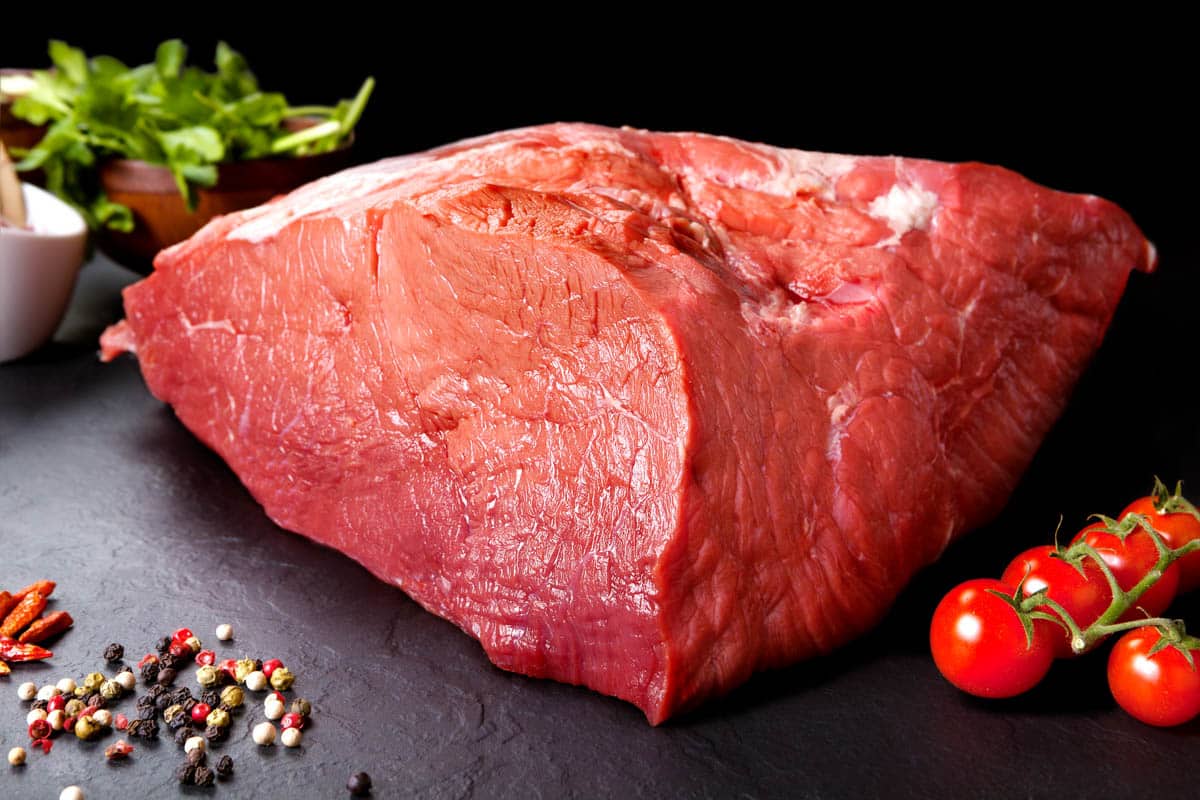
Sirloin Tip -
Second Most tender of the rounds. Not as popular, but still a very good piece of meat for making beef jerky.
- Very Lean
- Most tender
- A little more expensive
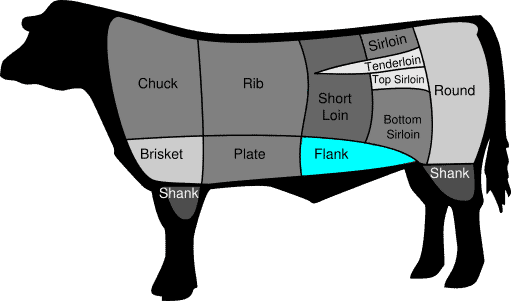
Flank Steak -
More expensive than the rest but still a great meat for beef jerky. If sliced with the grain, your jerky will be extremely tough. Better to slice against the grain when using this piece of meat when making beef jerky.
- Lean (need to trim some fat)
- More interior marbling
- Flavorful
- Can be a tougher jerky
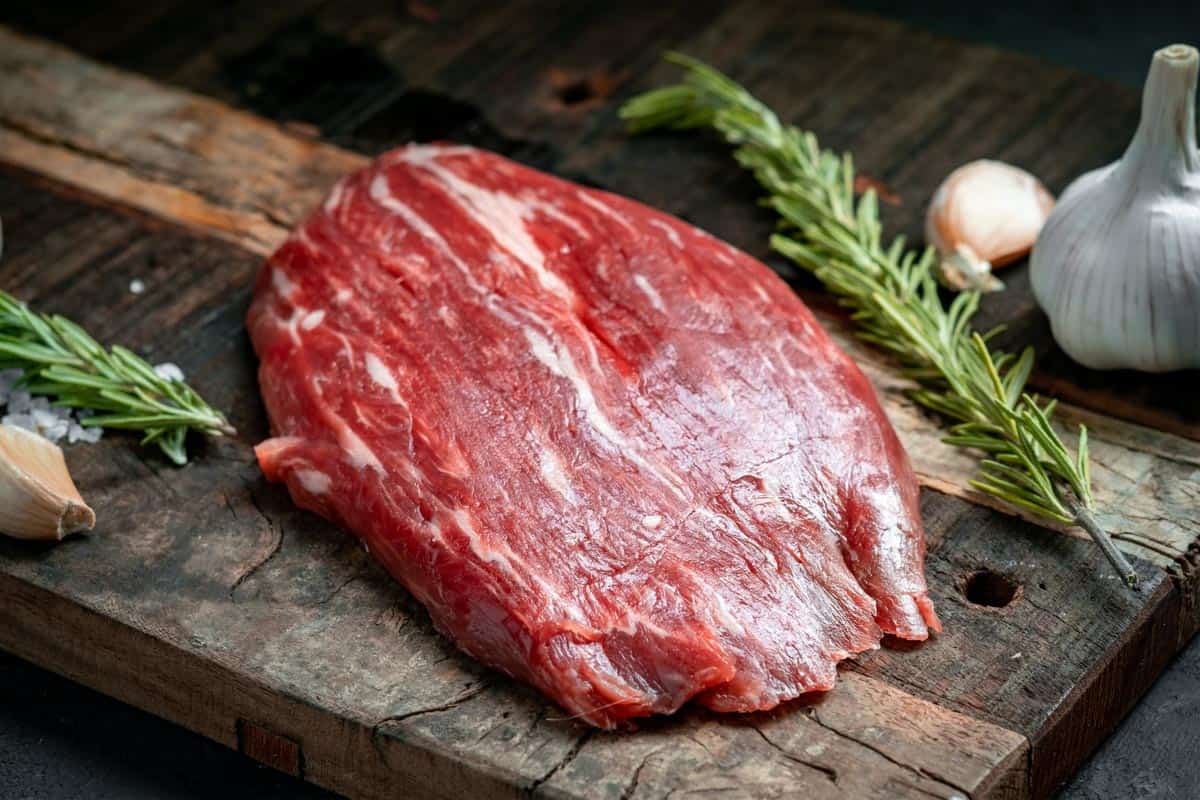
Ground Meat -
If making beef jerky with ground meat, make sure to choose a lean package. Many people like ground meat jerky because it is easier to chew and less harsh on your teeth. The texture is VERY different from whole meat jerky though, so keep that in mind.
- Makes easier to chew jerky
- Choose the leanest ground meat available (at least 90% lean)
- Requires a jerky gun or flattened and cut into strips
- Visit my page on How to Make Ground Beef Jerky for more information
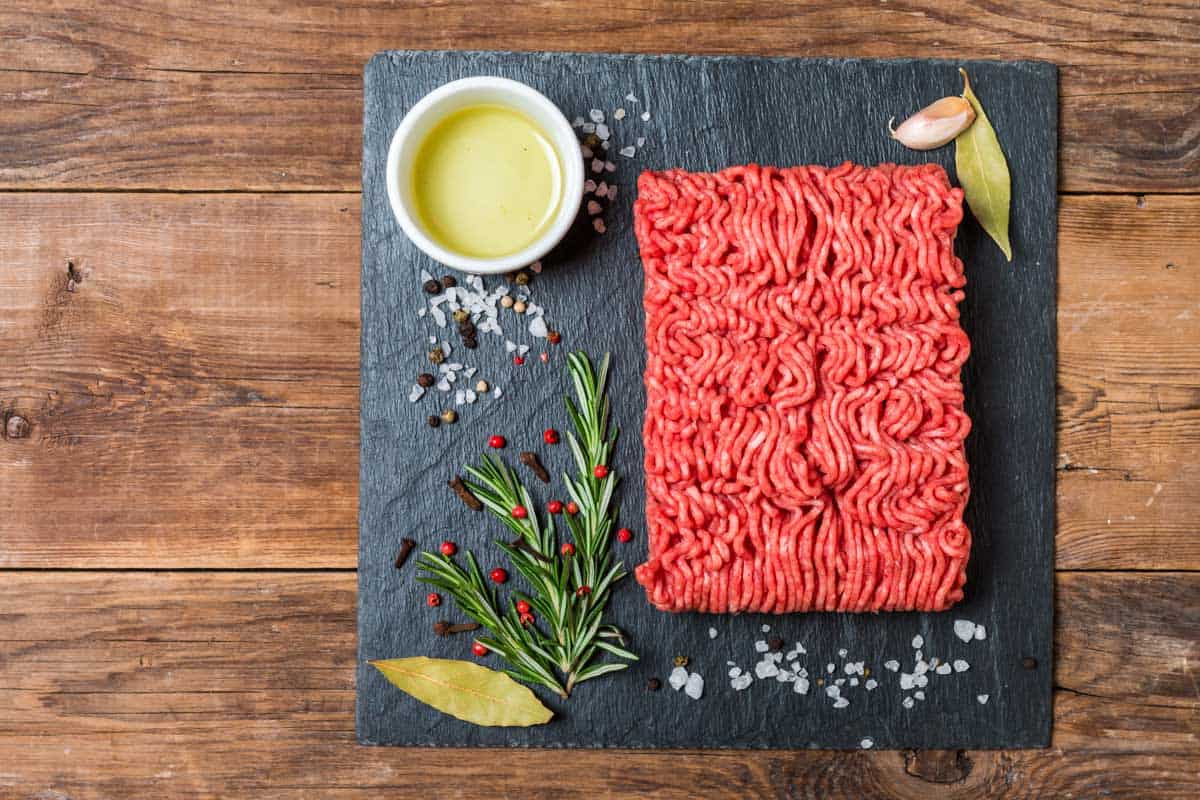
Deer Meat / Venison -
Deer meat is GREAT for making jerky! Venison jerky is some of my favorite. It tends to be very lean meat and very tender. If you harvest your venison yourself during hunting season, it is also about as organic as you can get!
- Very Lean
- Very little interior marbling
- Organic
- Great Game Flavor
- Tender
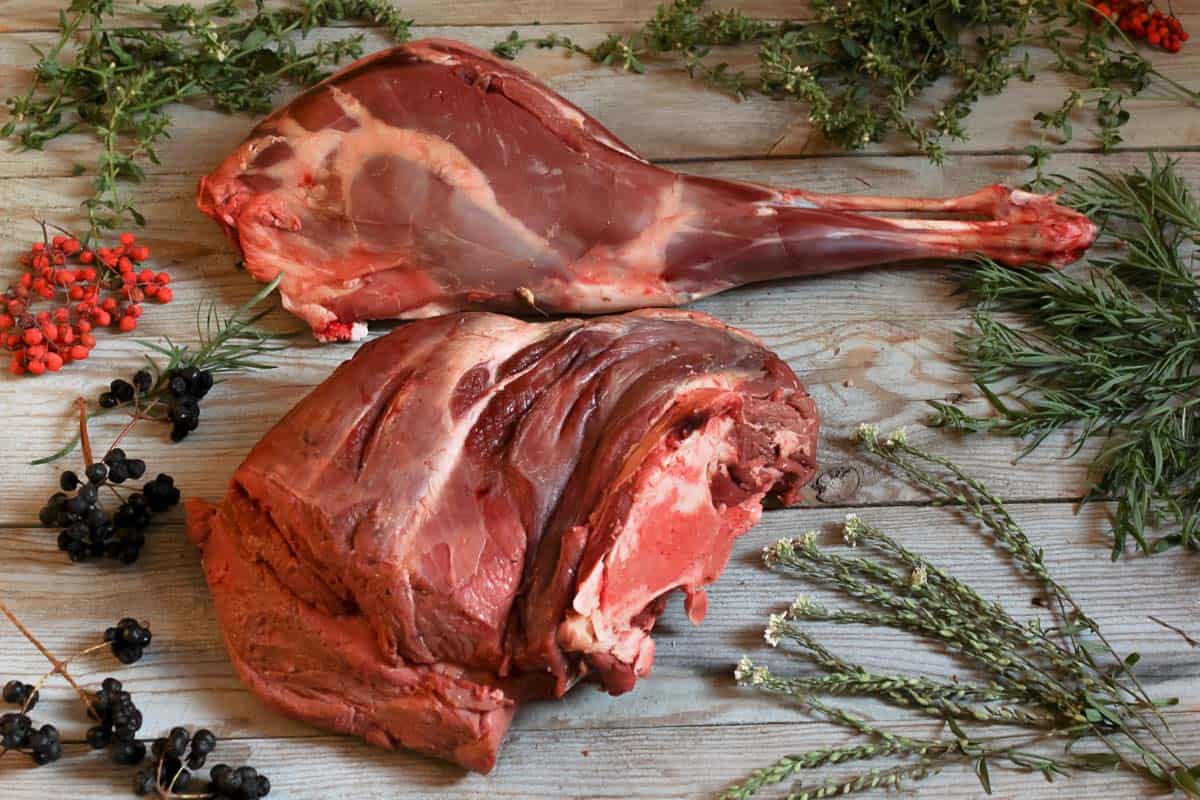
Elk Meat -
Just like Venison, Elk Roasts are very lean cuts of meat that are great for making jerky. Elk has a mild game flavor making it a fantastic option for even the pickiest of eaters in your family.
- Very Lean
- Very little interior marbling
- Organic
- No game flavor
- Tender
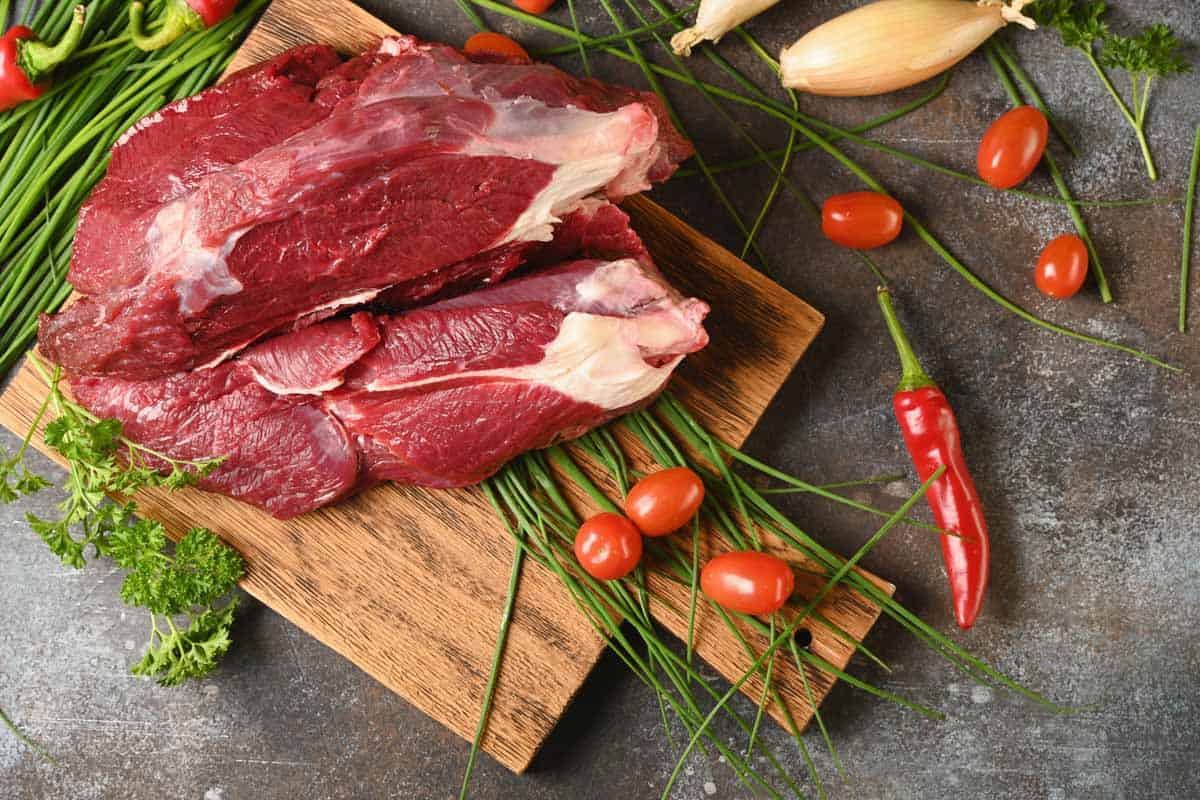
Pork Loin & Tenderloin -
A little fattier of a cut, but my favorite when using pork. Great for making pork jerky. Goes really well with sweet recipes, but also turns out great with spicier recipes.
- Flavorful
- Tender Jerky
- Economical (relatively inexpensive)
- Great with sweet recipes
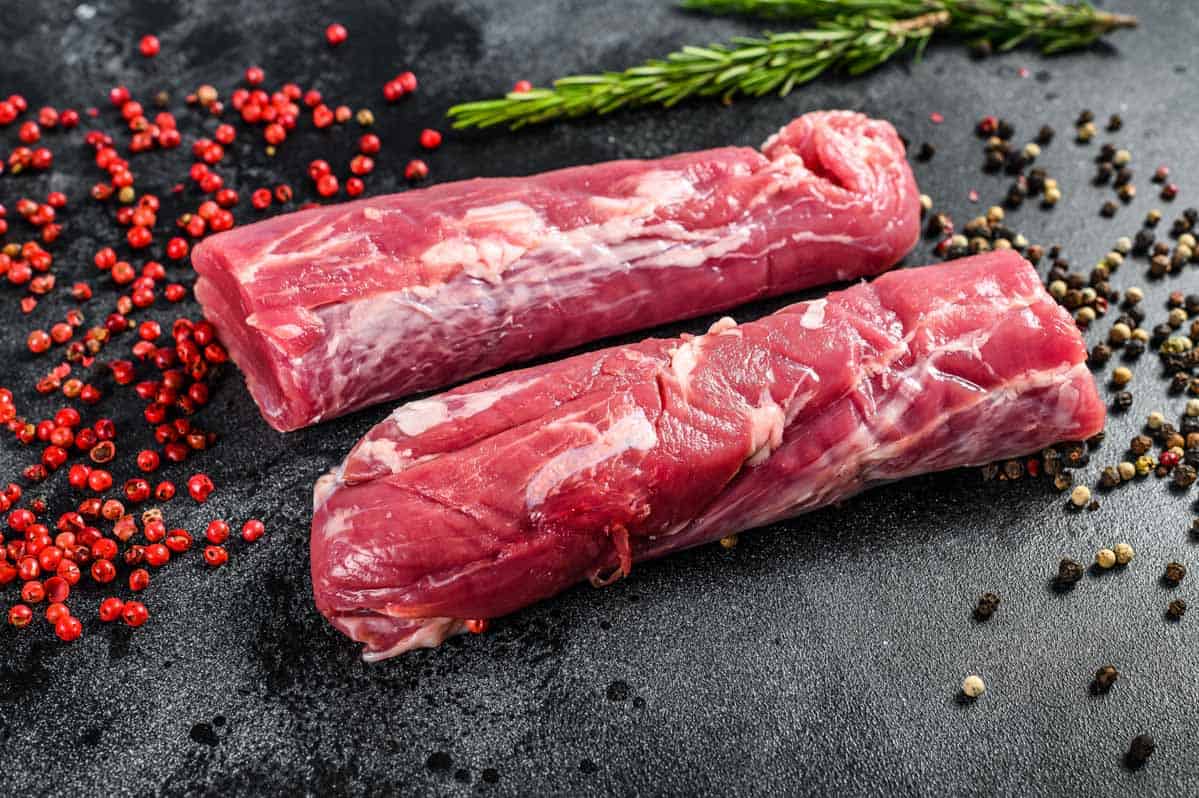
💭 Tips When Buying Meat
There are some ground rules that will apply across the board. When shopping for your choice of meat, make sure to follow these tips:
- Join big box stores such as Sam's Club and Costco for great prices on the best meat for beef jerky, sometimes half price.
- Never purchase old or expired meats
- Purchase the correct amount of meat. After drying, jerky will lose about ⅔ of its weight. If you buy 3lbs, you will end up with a little over 1lb of dried jerky
- Inspect each specific cut to find the one with the least amount of fat
- Ask the butcher to slice the meat for you - Many butchers will slice the meat to your specified thickness at no cost. This saves a lot of time!
If you have any questions, don't hesitate to ask your local butcher. I am sure they will be more than helpful in getting you what you need.
Jerky Recipes and Information
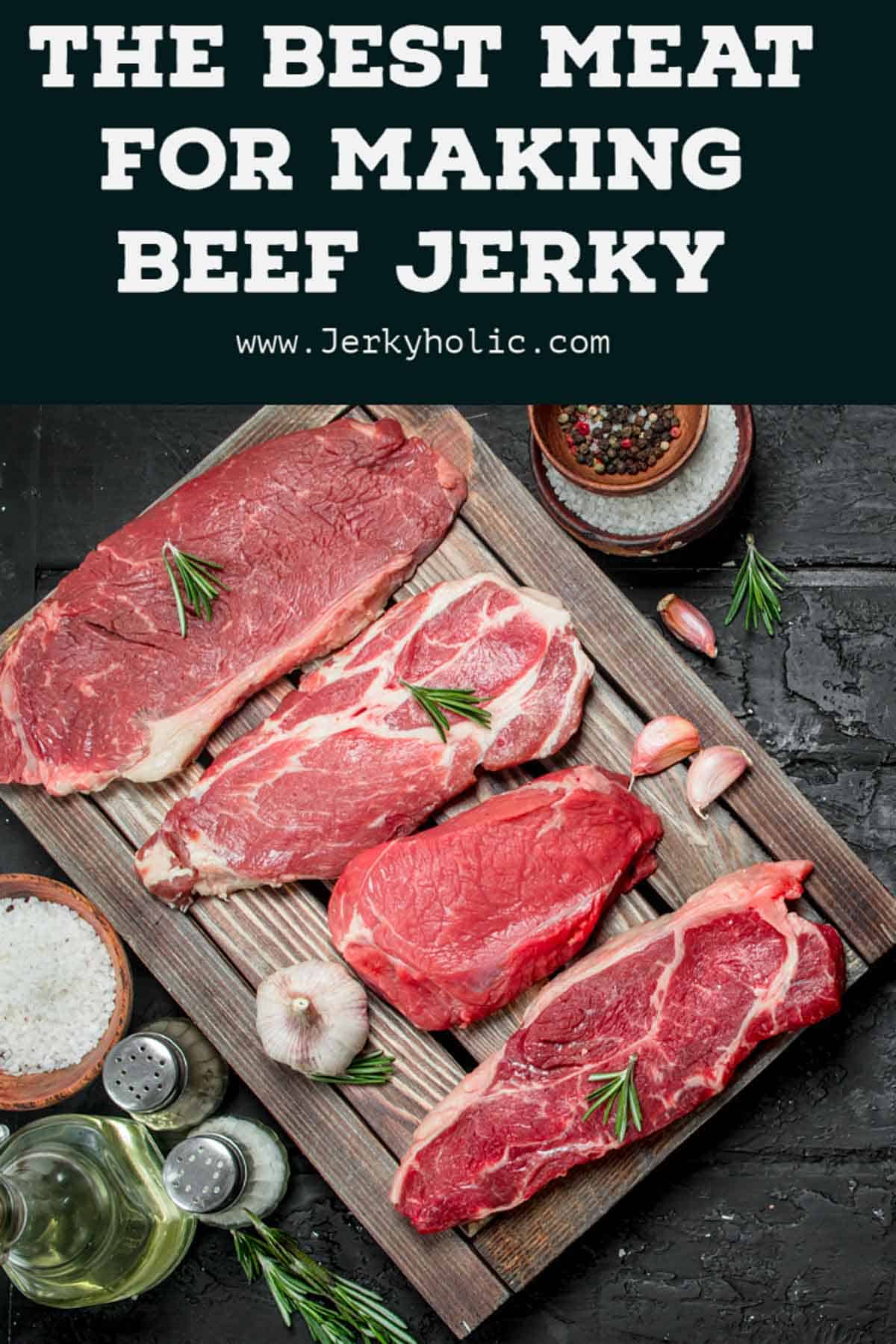


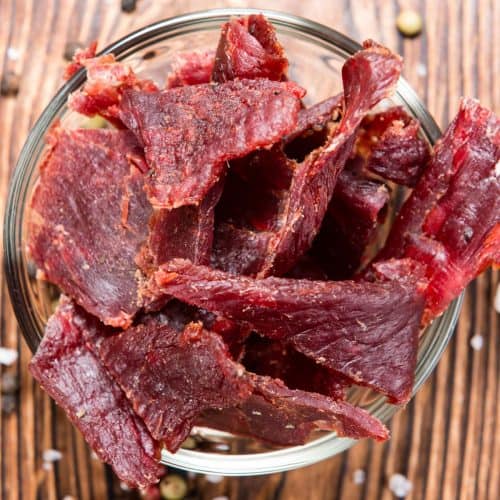
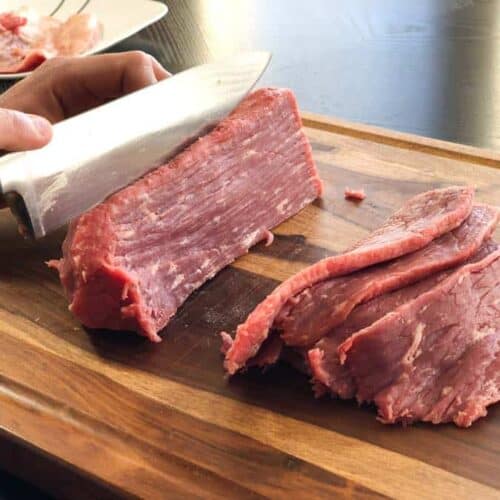
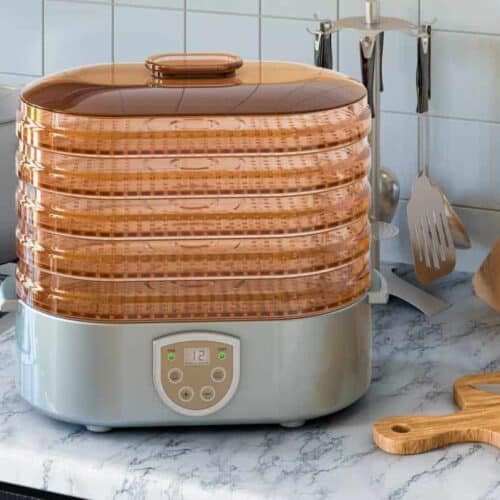
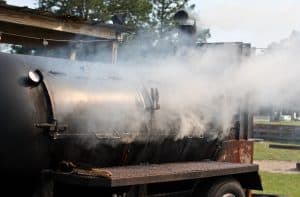
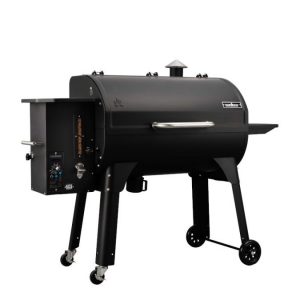
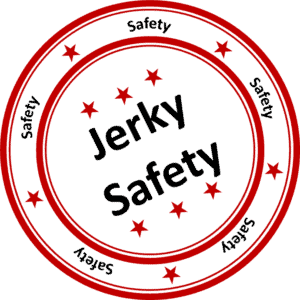
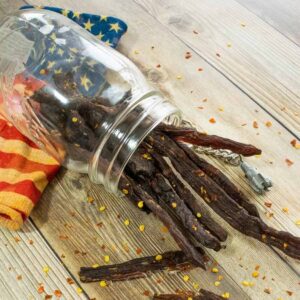
Speedwell says
Probably food-grade glycerin, which is a humectant but doesn't cause mold. Check the ingredients of your soft jerky for glycerine or a glycerite.
PAUL R. WHITE says
Where is the video mentioned it this article ???
Will says
At the beginning of the article.
Zeke says
When slicing the meat at home or having a butcher slice it, what is the optimal thickness of the slices?
Will says
1/8" to 1/4" thick is best for jerky.
Shawn Duffy says
So when you say 1/8th to 1/4” thick, are you talking finished jerky or the raw stage prior to drying? Since it reduces about 2/3rds…
Will says
Raw stage prior to drying. Slice the meat about 1/4" thick and then dehydrate.
Willy Demmer says
Tell em how we do gator jerky in the south st John's style
Michael says
My tip for beginners...
Some meat departments will have "stir-fry" labeled packages of beef, in long strips. It's usually really lean and evenly sliced. It helps skip a few steps! Look for one with nice deep red color and little to no marbling.
Mandi says
This is what I have tried so far. I’m scared to try anything else quite yet
Jeri says
Thank you for all of this great information! I will be coming back to this post when I'm ready to make jerky in the fall!
Michelle / Taste As You Go says
I've always wanted to try making homemade beef jerky since my family loves the stuff. I love this post because it'll be a great resource for us when we finally go for it. Thanks for sharing!
Debra says
Excellent info...I'm ready now to make the jerky!
Freya says
These are really helpful tips to ensure you get the best jerky! Thank you!
Lilly says
Thank you for the great tips and information! I am excited to make some jerky!
Faith Still says
This was so informative. I have never made jerky, but we raise our own pork for the boys for 4-H and usually put a pig in our freezer every year. I will have to try making some jerky. Plus my Dad (an avid hunter) gives us venison. I loved learning more about all of the different cuts of meat.
Will says
Venison jerky is amazing! Looks like you have some great meat for jerky, might as well start making it!
Anna says
London broil works well too
Ryan E Schneider says
I have an arm roast that I got from a quarter of beef and was thinking of making jerky out of it. Is it good enough? Thanks
Will says
Yeah, that should work great. Normally a lean cut with not a lot of fat makes it ideal for jerky.
Faith says
Do you have any tips or tricks that you can share for making moose jerky? We have a couple of freezers full of moose and I'd love to make some jerky to snack on when we go hiking.
Will says
I have never made moose jerky, but I would imagine that the beef and deer jerky recipes would work well with it. I wish I had a little more expertise with moose, I just have never had the opportunity to hunt moose. Let me know how it turns out!
Larry says
Hi, Will I’m a Jerky lover who’s sick of over paying for store jerky. It’s been a really frustrating week researching homemade jerky because I recently got a pellet smoker and was hoping to add homemade jerky to my prepping food supply but it seems as though I can duplicate everything the manufacturers are doing but the Jerky still won’t the last as long. So far I know I can get the leanest meats, use a food preservative, smoke the meat, put it in a Mylar bag w/ a oxygen absorber, and vacuum seal it, still only get 2 months of storage. freezing it doesn’t seem to benefit. Is there something I’m missing? Thank you for spending time writing great informative articles, responding to questions & comments
Will says
That's just about all you can do. The big manufacturers flush all of the oxygen out of their bags with nitrogen to really make it last long. I don't have any nitrogen so I just make small batches at a time. You just have to eat it faster! Haha. Thanks for the kind words... Good luck Larry!
Theo says
Hi
I could suggest adding some soft brown sugar if you use venison vs Beef.
Do not quote me, but when it gets to the deer that can have a gayme taste.? I splash some Worcestershire sauce in it when
nobody's looking.
Jim Bartlett says
Am old trick that works wonders is, after slicing, liberally coat the meat with celery salt. You will not taste the celery after cooking, drying, but it neutralizes the gamey taste. During years of a lean acron supply and no cornfields to raid, the deer in our area mostly lived in laurel leaves and left the meat strong. This method made that venison quite good.
Tim says
Hey Will...
Thanks for all the tips and instructions. I have your book, read what you write online, have purchased the dehydrator and jerkey slicer you use and am having a blast makiing really tasty beef jerkey. I have made most of the recipes in your book. My favorite is "Rig Hand"...
I live in the higher elevations in Western Colorado and will probably spend the colder days inside making more jerkey.
Will says
Wow, thanks for all the support in trying all my recipes and having the book! Rig hand is a really good jerky, everyone loves that one. Keep up the jerky making Tim, and stay warm this winter!
Jay R says
The web reminds me of my drinking days. I would often wind up in a spot without a clue as to how I got there. This is fascinating. Perhaps I'll try to make some in the future. (Note to self- bookmark this site.) To me, it looks like lucky left out at least one definition of jerk. I really liked Lucky's post. I have had in interest in etymology ever since I was young and got attacked by hornets. (I consider myself fortunate that it was hornets and not ambulatory trees.)
Troy says
Thanks for the great information!
meat eater says
Just when I thought there wasn't much t add t the conversation, I come across a cut called top blade roast on sale at the market. Supposedly, it is the 2nd most tender cut of beef and comes from the chuck. I guess it is cheap because it has a thick tendon running through the middle of it. The tendon is easily sliced out, whats left is then called flatiron steak, and that is expensive.
Deb says
Wait - we can use an air fryer for this? We have one, but haven't taken it out of the box yet, LOL. Is it a good substitute for the oven? This would be incentive for me to get going with that thing, instead of letting it lie about doing nothing!
Will says
I have never used an air fryer, but Vale say's that theirs mentions that you can. If you have a unit, I would give it a shot!
Deb says
Going to make a plan, and I'll let you know how it turns out.
I'm a simple girl - nothing fancy, though 🙂
Deb
Vale Hanzel says
Hello, I just started making jerky. I did a rib eye but cutnit to thin. My Air Fryer says 160° for 6hrs. Next time ill reduce the cooking time to 4hrs. What is the thickest i can slice the meat? Also I would like to try chicken or turkey jerkey. What is a good marinade? Is there any difference in temp or cooking time?
Will says
I wouldn't go any thicker than about 1/4" when making jerky. If you are making chicken or turkey jerky, make sure you pre-heat to 165F internal temperature before drying. I do have a couple recipes towards the bottom on my Recipe Page. Cooking time depends on so many things. If you pre-heat the meat, start checking it at about 3 hours of drying.
Diane says
Hi Will,
My name is Diane. My grandmother made deer jerky during hunting season and gave some to all the grandkids. She was simple. From what I’ve heard, only had salt and pepper in her kitchen. I’ve tried to recreate what she made by just using salt and pepper. I am only able to purchase venison from one local butcher shop and they buy it from farm raised. Not as gamey but still good. I don’t really like the flavor of soy sauce or Worcestershire or sugars in my jerky. I’m looking for amount of salt to use per pound. I will be making beef jerky as well. Suggestion for salt amount and also does it require marinating with salt and pepper or sprinkle on and dehydrate right away? Also, can curing salt be used for a dry rub like this or only in a liquid marinade? Thank you for your input.
Will says
Hey Diane! If I was only using salt and pepper, I would use about 2tsp of salt per 1 pound. Start with that and adjust as necessary. Curing salt really needs to be dissolved in a little bit of water. I would put the 1/4 tsp of curing salt in 1tbsp or so of water for it to dissolve, and then rub it on the jerky slices. There is no marinating required if just using salt and pepper, even curing salt.
Diane says
Hi Will
Thank you so much for your reply, love your sight! Well I didn’t see my post there so I thought it didn’t go through and I looked up info from the curing salt company and saw it needed cold water dissolve. I just did it last night. Yikes!?! Before your reply :(. This is what I did. 1 cup water, 2 tsp kosher salt, 1/4 tsp curing salt, 1 Tbsp soy, 1/2 Tbsp pepper. Marinated meat in bag ~20 hours in fridge, drained (not much to drain) blotted a little with paper towel then sprinkled pepper on one side and put in dehydrator. I hope I didn’t mess it up. I just started dehydration.
Diane says
Hey Will!
Jerky came out good but if I don’t have to marinate then I’d rather not. It might be difficult to evenly massage in the curing salt if only diluted into one Tbsp, maybe I’ll try two Tbsp, massage it in, sprinkle salt and pepper and then dry. Thanks for your suggestions, your expertise is a so awesome!
Jesica says
How would a sirloin roast work? I’ve never made jerky before so I’m new to the whole process! Excited to start though 🙂
Will says
Should work just fine!
Robbie Miller says
Will, have you ever used a vacuum marinater? (https://www.amazon.com/gp/product/B0115CGX4I/ref=ppx_yo_dt_b_asin_title_o00_s00?ie=UTF8&psc=1)
I use them for fajitas and they work great.
Will says
I actually have this exact one Robbie. It works great for jerky as well. If I don't have a lot of time, I'll break out this bad boy that way I don't have to marinate over night.
ALAN H MARBLE says
Hey there- new at making jerky, my bride bought me the Masterbuilt Pro Series smoker for Christmas, and have had great success so far with commercially made cure/seasonings (Hi-Mountain) and flank steak. Looking to expand my horizons, would love to know if you have a home-made cure/seasoning recipe...also looking forward to trying pork tenderloin, a favorite cut of meat of mine. Am a lifelong hunter/angler, retired in 2007 after 29 years as a Michigan conservation officer, worked from 2009 through 2017 seasonally (late July through early October) in a fly-in bush camp in western Alaska as camp cook and host (FIshing Bear Lodge). Raise and train Labradors for upland, waterfowl hunting....my own,, not for other folks...and am breaking in a new pup as I write this. Have the good fortune of having our son, my go-to huntin' and fishin' partner , living 5 miles away, who also is a master gardener and we get to reap the benefits of that in the fall after I return from AK. We live in the woods near Frankfort, MI, in the NW lower peninsula. Keep up the good work.
Will says
I have a lot of recipes Alan! Check out my Recipe page to find one you like. These recipes also come in handy during hunting season! Can't beat venison jerky....
Megan says
I'm making jerky on my own for the first time. My ex always made it and now I'm out of luck. I'd prefer venison but will settle for beef. However, I'm surprised by the method of using the oven or a dehydrator. I've only ever seen jerky hung out to dry by a string on a porch or clothes line..... is that just a thing we do here in the TX Hill Country?
Will says
I definitely wouldn't recommend doing it that way. Ha. Some people make little boxes that act like an oven when set outside in the sun, but straight on a clothes line with no heating element (or box to keep insects off and magnify the temperature from the sun) except the direct sun is probably not the best idea. Especially with flies and other insects that will be all over it. Glad you have never gotten sick by eating it though! I would stick with an oven or dehydrator...
Michael Bosisto says
I also make duck and goose jerky. Probably my least favorite to eat otherwise. I also make it without union powder so that my hunting dog has a very good for him treat that he loves.
My favorites are :
Deer , Elk, Pronghorn, bear and pheasant.
Yumm
Will says
I'm a fan of duck, but wild duck tastes A LOT different from farm raised duck. I would assume goose would be the same. I love making jerky out of deer and have yet to harvest an Elk or Pronghorn. Bear and pheasant sounds interesting!
Deb Burk says
My oven only goes down to 170º and it worked jut fine! Good luck 🙂
Will Costigan says
I do not own a dehydrator. My oven does have a warm/proof setting which I will use. The lowest heat setting is 170° which I believe to be too hot as the meat should be dried and not cooked. I will keep you posted. Thanks Will
Will says
I would check out my page on how to make jerky in an oven. Make sure to browse through my Recipes and find one you like. Let me know how it turns out Will!
Sabes1525 says
I am going to add Prague Powder #1 to my next batch of beef jerky. Never used it before but since I'm going use the home made jerky as Christmas gifts this year, I thought it might be best. Someplace I thought I read that you should not use Prague Powder with sugar, but now I can't seem to find where I read that or if I just imagined it. The marinade I use is a basic worchester, soy, honey (the sugar) and spices. Any thoughts on this?
Thanks in advance.
Will says
It's always a smart choice to use curing salt, especially if you are sharing with loved ones. I have never heard of NOT being able to use curing salt with sugar, I've never had a problem. The recipe sounds good, those are some very common ingredients for jerky. Just make the marinade taste great and the jerky will turn out great! I have some recipes on the site you can check out too.
John F. says
Thanks for this site -- it's great.
WalMart had a limited choice the other day, so I tried something called tender chuck steak. Not as good as round -- a bit tough, but not bad. Do you have experience with it?
Thanks.
Will says
Glad you are liking the site John! I have not used tender chuck steak. I would think that it would be more tough like you mentioned. I really like using the eye of round, it's my all time favorite. I try to stick with that!
christina bednarski says
What about using beef brisket for jerky? And is there a way I can smoke it just a little before putting it in the dehydrator?
Will says
I have never used beef brisket but have heard of other using it with good results. You can totally smoke it for an hour or two to get the smoke flavor and then transfer it to a dehydrator.
Bob Weaver says
Hi Will. I haven't used brisket either but I do my jerkey in my Masterbuilt smoker. The electric one goes down to 100F or so and I use that to smoke and/or dehydrate my meat. The gas smoker only goes down to 225F. As far as brisket is concerned, it often is a pretty fatty cut and I would have concerns with that aspect. The flavor should be awesome but much of brisket's flavor comes from the fat. If using brisket I would use the point and not the large end because it is much fatter.
Dave C., Goodlettsville, TN says
Hi Christina,
Yes, Brisket makes wonderful jerky and you can season and smoke as little or as much as you like before transferring to your dehydrator!
I usually trim most of the fat off the brisket since it helps the drying process and the fat will go rancid quickly if too much is left on the meat.
Enjoy
Allan says
Was wondering about using a better cut of meat to make jerky such as sirloin tip or top sirloin, what is your thought on this? I know cost sometimes is a factor but was going to try smaller batches so the cost is not that big of a deal.
Will says
They should work pretty well for jerky. Just make sure to slice off as much fat as possible. They will be more expensive, but not a big deal if you are only making small batches like you said; Go for it!
Dean says
I've used both top and bottom sirloin and both turned out great. I personally didn't notice a huge difference in quality using either cut of beef.
Ladd says
I made jerky for the first time last month kept it in sealed glass jar and it molded in a week did I not dehydrate it long enough?
Will says
Check out my page on storing beef jerky. If you did not use any curing salt, oxygen packages in the jar, or vacuum seal the jerky, it will last about a week outside the fridge. That page will have all the info you need.
Tim Kenney says
Was your marinade salty enough? Our jerky doesn’t last long enough to mold. But your culprit could be either too much moisture or not enough salt
Dolores says
Thing with Jerky is everyone has their method......I go sharp knife with defrosted....or better yet never frozen beef!......People do not look after their knives enough...you need to be able to shave with it then it slices thin and true!
Will says
Yep. You are totally correct. If you keep your knives really sharp, there is no need to freeze.
David Parker says
I own an old Magic Chef Dehydrator, saw an online site for using my oven as a way of making jerky and thinking about buying a Power Air Oven Dehydrator from Nu Wave. Which of these three would be your first, second and third choices??? Tired of buying jerky @ convenience stores, and as a POS in grocery stores.
Will says
I haven't used those dehydrators, but I do like making jerky in the oven. You can check out my page on making jerky in an oven as well.
Tim Kenney says
I bought a 9-tray Excaliber dehydrator and can fit 10 pounds of London broil into it to make jerky at one time. It does a great job.
Stacy Michelle says
This was a good read, I've never made jerky, and came across your page trying to learn. I was not disappointed! Even as I read the comments... I like the way you carry yourself. Such a positive attitude! I will definitely be keeping tabs on the recipes you have here.
Will says
Thanks for the kind words Stacy! Glad you are enjoying the site.
Jerry Vinson says
in the picture I would guess you are at the Dillon dam. I am printing most of what you say about choice of cuts of meat. What is your opinion on freezing the meat then sawing it to get even dimension cuts or do a soft freeze of 22 to 28 degrees.
Will says
Hey Jerry! I'm guessing you are talking about the picture on the front of my site. I am actually on a boat in Hawaii, but Dillon dam would be a good guess! Going to do some sailing up there this year. I like to freeze the meat for about 2 hours to firm it up before slicing. I don't like it totally frozen, just a soft freeze as you mentioned.
Sam A. says
Hi Will, I've been loving your website! I am new to the jerky making scene and I am so far loving it. I am not sure if anyone wrote in about this yet, but I can definitely use some advice. I have religious restrictions on which animals/part of the animal I can eat. Specifically the cow forequarters are fine. These sections include the chuck, rib, brisket, plate and shank. The hindquarters are off limits. I have tried using top of the rib a couple of times and so far it seems good. The issue is that top of the rib is an expensive cut. I know there are others who use shoulder and I think brisket. Do you have any tips as to what forequarter cuts would be best in terms of taste (most important) and price.
Once I'm here, I'll fill you in on what I've done up until now -
So far, I have been using a baking pan/rack on 175F in the oven with the door propped open a few inches for 4 hours. I've used different marinades that I let sit for 4 hours as well. I've had the butcher slice up the meat 1/4" and I've done it by hand to make much thinner slices. So far, the thinner slices were much better as the thicker ones tasted like London broil due to their thickness. My goal is to have a nice tender and flavorful jerky, not chewy and tough.
I know I have a ways to go as I'll be playing with different recipes and I'm sure I'll get a dehydrator somewhere down the line. Any advise you may have on making improvements would be greatly appreciated. Thank you for your time.
Will says
I am not sure if you can use the Flank, but flank steak works great and isn't too expensive. I have not made jerky with brisket but many people do. I wasn't even aware of this type of religious restriction, thanks for teaching me something! It sounds like you are doing everything right. Just make sure to slice the meat against when trying to get a more tender bite. Also tenderize the meat before marinating with a meat mallet, this will help with a chewier bite as well.
Brenda Johnston says
I’m new to making jerky and love your site! Thank you! Our daughter is with a missions organization and goes overseas for three months at a time. Usually to remote areas. How can we safely package jerky for her trips? Any tips would be greatly appreciated!
Will says
Check out my page on Storing Beef Jerky. Vacuum sealed would be the best bet.
Keith Hamilton says
Hi Will. First time to post. Been making jerky for about 5 years. Started out using a wine barrel smoker that I made with a burner plate for my heat source. Am now using
a Bradley 6 rack electric smoker and sometimes my Green Mountain pellet grill. Have tried some dry rub recipes, but haven't found any I like. Always go back to my red wine and soy sauce marinade. Am interested in trying some of your recipes. Do you ever use electric smokers? Keith
Will says
Wine barrel smoker?! Awesome! I do use an electric smoker every once in a while when making jerky. I love the flavor that a smoker gives the jerky and wish I could use one more often. Unfortunately I live in an apartment and was told they frown upon the use of an electric smoker on my balcony. So I only smoke jerky now when I make a trip to my folks house. (They are currently storing my smoker... along with a lot of other crap) Let me know which recipes you try and what you think about them. Thanks for commenting Keith!
brian says
I don't know if it was mentioned anywhere on the site...but goose breasts make excellent jerky. I used to make it all the time and I would give people samples without specifying what it was...nearly every time they thought it was deer jerky. Anytime I bag geese, they become jerky.
Will says
Wow! Never would have thought about that Brian. Thanks for the advice!
Mary says
Hi - I've seen online that people have made venison jerky using cubed venison. Have you any experience with this? I usually use my cubed for making venison parmesan or chicken fried steak but would like to try jerky with the cubed meat if it is worth my time. If yes, any helpful hints would be greatly appreciated.
Thank you.
Will says
I have not made any jerky out of cubed meat. I have bought some at different jerky spots while travelling. It seems like it is just a very thick piece of jerky. I would use curing salt to help prevent bacteria since heating a thick piece of jerky to 160F is going to be harder to do. I wish I had more experience in making chunks of jerky so I could help you out. I'm just not a big fan of them...
Mary says
Will, I'm going to use the curing salt along with my secret stuff...and give it a try. I will let you know how it comes out. Nothing to lose in trying, right?
John Pritt says
Is it possible to use beef tenderloin for jerky? A friend went out to a store and purchased 8lbs of tenderloin for me to make jerky for us both. The loin is packed in a plastic bag so I hate to cut it open if it is not suitable due to a high marbled fat content. There is a significant amount of fat on the outside of the loin but not sure if that is a sign of excessive marbling on the interior of the loin.
Will says
Some tenderloin is not fatty at all inside, so I'm not sure if the tenderloin you have will be fatty or not. You can make jerky out of it though. If it does have a good amount of marbling, just keep the jerky in the fridge and eat it within a week. Normally jerky is made out of less expensive cuts, but tenderloin should taste great!
Brad says
I just made my first 5lb batch of jerky with my new Cabela dehydrator. Butcher told me the most common cut of beef is church roast. Needed a bit of trimming around edges however results were excellent. Used cables brand mix. I'm hooked. Family loves it. Gonna try some recipes from your site soon.
Will says
Awesome! Chuck roasts are normally pretty fatty. I would try an eye of round or top round next time. Welcome to the world of beef jerky!
Deb says
I've never heard of a "church roast" and when I tried looking it up, all I could find were recipes for pot roast for taking to church, LOL. Those recipes used a variety of cuts. Can you please ask your butcher if there's another name for it? I'm still waiting to get eye of round on sale, myself, to try. Thank you!
Will says
He meant chuck roast, not church roast. I did the same thing, looked it up because I had never heard of it! Ha.
Deb says
Oh, I see...missed your comment! Thanks 🙂
Deb
Javier says
Hey guys I recently made some jerky for the first time. I used top sirloin only because it was on sale for 2.77 lb. I made 3 batches of 2 lbs each. Since it was my first time I a gave most of it away to friends and family. I went shooting with some friends and took some. Everyone told me it was the best jerky they have ever tried. I used my pellet smoker by camp chef. Just got my jerky racks delivered yesterday. Now I have to find some meat on sale. Smoked the meat for about 2:30 / 3 hrs on low smoke setting. Teriyaki chipotle flavor.
Deb says
Clarification request: You listed both eye of round and sirloin tip as the most tender. Which is actually the most tender? I made jerky once, with flank steak, and I liked it, but would prefer to try a more tender cut of meat. Our local market has the top round on sale, but I'm going to pass it up, since I will want either eye of round or the sirloin tip, depending on your answer. Yes, I trust you that much!
Will says
Thanks for pointing that out Deb! The eye of round is more tender and is my favorite cut of meat to use when making jerky. Go with the eye of round!
Larry F says
Hey Will............Krave and some other brands of beef jerky have a very soft and tender type of beef jerky... How do they get that tenderness?
Will says
I have been trying to figure that out for years Larry. If you figure it out, let me know! Ha.
Dean says
This is a great website, definitely needs its own forum IMHO.
Keep up the great work!
Will says
I need to look into that Dean. Thanks for the tip!
Sye says
Yes indeed it is. all thanks to Will
Dennis says
Sorry if you have answered this question before but i want to do pork jerky using seasoning i use for competitive BBQ. I plan on just using a pork tenderloin. Are there any safety or other issues with this i need to be aware of or can i just dehydrate it the same as i do with my beef jerky? Should i use curing sald like i do for beef?
Will says
Hey Dennis, just make it the same way you do beef jerky. If you heat it to 160F you don't have to use curing salt, but cure definitely makes jerky last longer and helps kill any potential bacteria. If you already use it on your beef jerky, I would use it on your pork jerky as well.
Ed Matthews says
By saying he will use the same seasoning he uses for BBQ,sounds like he will sprinkle rub on the strips of pork. No marinade? There are So Many recipes for beef jerky out there and it all pertains to what you personally like. I would say marinades for PORK may be slightly different.....Just pick something you would like. If you use RUB, let us know what you used. $.02
Debs says
Hey,
thanks for your post on cuts - i got my first batch on in the dehyrator! (i'm celiac, and I can't buy most commercial stuff as it has soy sauce in the seasoning - poison due to the wheat content - so I'm going to figure this out and make my own!)
Ed Matthews says
I have read many articles concerning which way to cut your choice of meat, with the grain or against the grain. Do or can you cut it diagonally against the grain. We need a section dedicated for this. A video would help too. I have been cutting Eye of Round against the grain and seems OK after it dehydrated. I am thinking about cutting up a Beef Brisket....that will be interesting. Help.....
Will says
You can cut the meat in any direction you want. With the grain makes it the most chewy, against makes it more tender, and diagonal would be in between. If you are going to use a big piece of brisket, I would cut it into smaller chunks and then slice it from there. Make sure to take off all the fat cap as brisket normally has a decent amount of fat.
jimmymann says
Going to try making jerky for the 1st time and found lots of useful info here. Got a Masterbuilt propane smoker for Christmas and can't wait to fire it up. Picked up some eye of round. Found the Cuts of Beef section very helpful. May do some venison too but want to see how the beef turns out 1st. Temperature will be -22C or -8F up here in Canada the day I am smoking! Kudos on the website!
Will says
That’s cold Jimmy, you’re a bigger man than me to brave that...
jimmymann says
If it was that cold where you are you would be trying it too. No way am I waiting until spring. I hope I can keep the smoker at the proper temps in this weather. Going to put in in a semi protected area with the temp gauge on the smoker facing the window (5 feet from house). I am looking into getting a wireless thermometer in the future to monitor the smokers temp so I don't have to go outside too much. I'll let you know how it turns out.
Will says
Yep, a wireless thermometer sounds like a REALLY good idea! Ha.
Bob Weaver says
Jimmymann, I also have a MB propane smoker but about the lowest temp MB says it will go is 225f. Your jerky may dry rather quickly so watch it. You can slow that a bit by cutting it a bit thicker. It will still make tasty jerky.
LARRY FOWLER says
Jerky is so expensive when buying at the store!....like $12 for 8 ounces...
Do you sell your jerky?
Will says
You are totally right Larry, Jerky is very expensive! That's why I put this site up!! This way people can make their own jerky and save some $. I do not sell any jerky, there are plenty of people selling it already... I'll leave that to them for now.
Tim Kenney says
Bought an Excalibur 9 tray dehydrator and love making my own jerky. The best part is YOU control what goes In it. Love your site and keep up with good work.
Will says
Thanks Tim!
Cindy Warner says
I’ve recently started eating a small amount of jerky most days for a snack. Since I don’t want to buy a dehydrator, and I really don’t want to keep buying it from the grocery store, I am VERY excited that I found your website!! What I’ve read so far is very helpful. I can’t wait to try my first batch - just have to go through your recipes and choose one! Thanks, Will.
Will says
No problem Cindy. Have fun making some jerky!
Bob Weaver says
Have made the Pepper-Garlic and Tennessee jerkeys. I over dried the Pepper-Grrlic si ut was a bit dry. But I sliced the bottom round across the grain and it was great with the beer I was drinking. The Tennessee was PERFECT!! I shared it with friends at deer csmp and it was a hit!! Now making another batch of each and will agsin use my Masterbuilt electric smoker. I also have a gas MB smoker but it is too hot. Great recipes. Have to try the boyrbon one.
Will says
Glad to hear your success with the jerky Bob! Now you just need to harvest a deer to make some venison jerky!
Jeramie says
So I just received my dehydrator yesterday, would have been sooner but Irma delayed UPS. I have always loved Jerky, but finally decided to make it myself. I really enjoy intense spicy jerky and I have some hot sauce that would blow your mind the level of heat it produces. I have been reading about which types of meat to get so i will buy some this evening and prepare the marinade and let it sit overnight until tomorrow when I actually go through the process. My question is how long do you actually leave the meat in the dehydrator and at what temp setting? As far as marinades go, is it just as simple as whatever types of wet and dry spices in a bag with the meat overnight? Is liquid smoke a necessity?
Will says
So I have a couple of pages on this site you would like and get some good information from. The short answer for a dehydrator is; start checking it at 3.5hrs and dry at 160F. But for more in depth information on drying jerky check out my making jerky page. For more information on recipes, check out my recipe page. But you are 100% right, a marinade is just whatever wet and dry spices you want in a bag over night. Liquid smoke is NOT necessary.
Tom Smith says
Thanks Will for all your information. It was helpful. I have a recipe that my family loves thought I'd share it. It's for 4 lbs. of beef. 1) 12 oz. of Soy sauce 2) 3/4 cup of liquid smoke 3) 1 bottle of Kraft brown sugar BBQ sauce 4) 2 tablespoons of Lee and Perins Worcestershire sauce 5) 2 cups of brown sugar. Let meat marinade for at least 24 hours. "Just my opinion" but although flank is a little pricey I think it has the best flavor profile for jerky. I am going to try the other cuts of beef you recommended. Thanks again for all your info.
Will says
Thanks for the recipe Tom. I will have to give it a try!
Madalyn says
Hello Will,
I made some Habanero Tabasco Jerky using your recipe with eye of round meat. My husband and I both agreed that it is the BEST jerky we have ever had, bought or made before. This recipe is a winner! Thank you for sharing.
I do have a question, however. Can I use the same recipe using deer steak meat? And should I soak the meat in salt water prior to marinating? Looking forward, to your reply.
Will says
Glad you found a winner! This is one of my favorite recipes as well and it should taste great with venison too! I don't soak my deer meat and it is always to warm in South Texas to hang it. I do go on hunting trips for days and a deer might sit on ice for a couple days quartered, so this might help get out some blood and gamey flavor. If you want, you can soak it but I don't think it is necessary.
Teresa says
I can't believe I lived this long without tasting beef jerky. My contractor gave me some and I am totally hooked. Now I want to make it. I read your Best Cuts Of Beef for Jerky, but I don't see London Broil listed. Maybe that's mot the right name for this cut of beef. Do you know what cut of beef a London Broil is, and if it would make good jerky? Thanks
Will says
Hey Teresa. London broil isn't really a cut of meat, but sometimes you see it listed as such in the super market. London broil is sometimes used to describe a top round steak. Top round is great for making beef jerky.
Joel says
Hey Will
Just came across your site while trying to figure out how to start making jerky for the first time.
My question is I have a piece of scotch fillet (that's what the cut is called in Australia anyway) in my freezer I was thinking of using to start with. Obviously this is fatty cut of meat with the most marbling.
If I'm just trying flavours and techniques with small amounts will this still be alright if consumed within a couple of days? How long do you think it would be safe to live this in the fridge?
I thought that as long as its eaten before the original used by date It should be fine. Would the drying process add some days to that do you think?
Thanks
Joel
Will says
Thanks for coming by Joel. I'm glad you have found the site to be helpful! Always try to dry your jerky by the expiration date. The expiration date is more of a 'dry by date' instead of an 'eat by date'. If the cut you have is a little bit fatty, it is still okay to use. I would keep it in the fridge after drying and for only about 3 or 4 days. Just keep an eye out for mold. You will also have to pat dry your strips while they are dehydrating to absorb some of that fat. Let me know how your jerky turns out!
Richard says
I was just reading your Steak Jerky recipe and wanted to tell you I have done the same thing, I was cutting a try-tip roast in to steaks and had the thought to use some for Jerky (Yes it is way too fatty for real Jerky It came out great and the extra flavor from the fat was nice too. I did not make much and ate it with in two days and kept it in the fridge. I am thinking it would be good for a foot ball party where it would be gone with in minutes.
Now for my question I do not see you ever mention London Broil for jerky. I totally acknowledge it is not the best for Jerky but it is way cheaper where I live, can find it for $2.99 on sale) and I have made some descent Jerky out of it. What is your take on this, slicing it is a but trickier. Typical Eye of Round (prefer it above all other cuts of meat) is $5.99 a pound and sometimes on sale here for 4.99, once in a blue moon I will find it for $3.50 a pound.
Will says
If it's going to be eaten quickly, a fattier piece of meat will work just fine! London Broil is another name for Top Round, so I do use it every once in a while I just don't refer to it as London Broil. Top round isn't my favorite roast to make jerky out of, but if it's inexpensive enough it will definitely do the trick!
Max says
Hi Will. I came across your site and I enjoy it a lot. I too live in Austin and starting to make jerky myself. I am curious where you are getting your meat from here in Austin. I'm in South Austin (Oak Hill) but don't mind driving anywhere. I would like to find a place to get Eye of Round cuts. The local HEB's don't seem to carry it near me and the 2 meat markets I've been to felt really shady. Like old meats and strange staff haha! Just curious where you are getting the cuts from in Austin. Thanks.
Will says
Hey Max! I just moved to Colorado, but lived Northwest Austin, over by 2222 & 620. I got all my eye of round from HEB. I never had a problem finding it at my local HEB, maybe you should ask the guys behind the counter about it. Now that I live in Colorado though, I AM having a problem finding eye of round. My local King Soopers grocery stores do not carry eye of round, only bottom round. I am going to check local butchers tomorrow....
Kathi Farrell says
Love this site. For the most part because of the helpful replies. I bought 40 pounds of eye of round and made jerky for Christmas. I used Hi Mountain Jerky Cure Hickory Flavor. Good thing it's what I wanted because it's the only flavor Dicks carries without MSG. Used a meat slicer and everyone loved it. My son was in the Marines and now teaches shooting on the side. So I did it again but this time I used London broil and the butcher sliced it. So much nicer! Thanks to whoever suggested that. It was 2.99 lb so I bought another 40. They liked the London broil better. Made Mr. Yoshidas which was tough. Didn't like it. Made one I got from Pinterest called Whiskey Pete. My husband said I never need to use any other recipe. But I like my hickory so made that too. Vacuumed sealed so son could take to range. That was March 1. and it's gone. Now I'm on the prowl for sales. My first batches ever were venison and elk. Hubbys boss and brother just got home from Texas with six. Hoping to be the recipient of some. It's the best of all!! Thanks to all for the positive helpful posts. Read them all. Kathi, Durham,CA
Will says
Thanks for coming by and checking out the site. I am glad that all the comments and info helped you out. I wanted to ask what make and model of meat slicer you used? I normally make small batches and slice by hand, but want to check out some meat slicers for larger batches. Thanks in advance!
John says
Hello Will
just wanted to say thanks for all the great information. Close to my house there's a shop they sell deer and wild boar meat , just wondering if you have ever used wild boar ? Or maybe a little bit to fatty ? I have not yet made jerky I just ordered my curing salt and I am trying to gather all the information I can to make the best jerky possible. Love your page
Will says
Thanks for stopping by and I am glad you are enjoying the site. I have not made boar jerky before. People make pork jerky, so it is definitely possible as long as you pick a lean cut. Let me know how your jerky turns out when you make your first batch!
jack burton says
A great piece of meat to make jerky with is rabbit flanks. These are the two side pieces that come from the belly when you butcher a rabbit. They are about the size of a hand, and are thin enough to not need any further slicing. They are about as lean as you can get. If you know someone who raises and butchers rabbits see if you can get about a dozen or so flanks to try out.
Harry says
Hey Will -
Thanks so much for for the immensely helpful tutorials and recipes!
I was curious if you ever bought round when on sale, sliced it up, vacuum sealed it, and froze it for future recipes. Fairly good sale ($2.99/lb) on large slabs of bottom round going on now where I am and I'm tempted to buy several. Thanks!
Will says
No problem, glad you are enjoying the site! I have not sliced it up and froze it; but I have bought rounds, vacuum sealed, and then defrosted later to make jerky. I also freeze my venison in 2-3lb roasts, then defrost and slice. It works great! $2.99/lb is hard to beat, would be a great idea to stock up!
Harry says
Just chopped up 50 lbs of bottom round and vacuum sealed and froze about 30 - the refrigerated part will be used over the next couple of days. Discovered another place has Sirloin Tip for $2.89/lb for the next week, so my freezer may get even more full if I don't eat all my chili lime!
Will says
Haha. I love it. That is an unreal price on sirloin tip. Can't pass that up...
James says
I discovered... purely by accident. That if you slice and marinate your meat and have to leave unexpectedly. You may have to put it in the freezer for a few days... weeks, months.. After it's frozen the time really doesn't matter.
when you take it out to defrost, let it get to room temperature. VERY IMPORTANT, GET TO ROOM TEMPERATURE in the package that you froze it in with the marinade.
Then... proceed with your process, OMG!!! the flavors are amazing!
I think it has more to do with the way the meat expands during the thaw process than anything, but I have started to do this on purpose an have had amazing results with all my recipes. I am from New Mexico, so a lot of my recipes include some sort of chile or south western flavor.
Would be fun to get together some time Will!
Will says
Interesting! Thanks for the tip, I'm going to have to try that soon. I haven't spent too much time in New Mexico, need to make it that way and check it out!
Joe says
If fat is so bad for jerky, what about bacon jerky? You know there's fat in that. Doesn't the fat go rancid and bad like in beef jerky?
Will says
I would think so! I have never made bacon jerky, but would assume it would not have a long shelf life.
Bill says
I gotta say... this batch is fantastic. It's not something you would eat in bulk,more like a dessert after feasting all day on the heard
Bill Likes says
I too am a first timer here and still green with the process. I've bought several cuts of beef during my 4 attempts..all cross cuts..bottom, top and eye of round, flank, top sirloin, t-bone, beef tenderloin, and pork tenderloin, ground and used a gun. Gun texture too undefined, bottom, top and flank to tough. Eye of round-maybe-if I went thicker? I think the t-bone got lost in the sirloin. Both tenderloins are tender but dang...there has to be a better way to better choice to get a texture that you can pick at it all day and not have sore jaws at night.
If you are after tender, what's the best answer with cross sliced beef? And to make it even more complicated, I also want it thicker than the 1/4" cuts that I have done thus far.
I have marinated with different Nesco seasoning and now have my own Prague powder to start making my own. Does the cure cause it to be more tough?
Thanks in advance for your input
Will says
Hey Bill, thanks for stopping by. Sounds like you have really been testing everything out, that's great! My favorite cut is the Eye of Round, but all the jerky I make is a little tough. If you eat enough, your jaw will hurt at night. Slicing against the grain of the meat really helps make the jerky softer, but it still can be kind of tough. I have not found that the cure makes the jerky tough, I feel like it actually makes it a little softer. You can try to slice it a little thicker, the meat might be a little more tender inside, just make sure to heat the jerky to 160F all the way through.
Bill Likes says
Thanks Will!
I just finished mixing up my first batch of homemade marinated and cut some eye of round to a thicker 3/8" (along with a lb of cubed steak just for the fun of it)
I was hoping to tap into this wealth of knowledge to make sure I'm not doing something out of bounds.
My marinade includes among other things, soy, olive oil, wine vinegar, Worcestershire, brown sugar and spice, but no cure ....yet.
I plan to let the 5 lbs of meat sit in the sauce for 24 hours as a "tenderizer" then remove the liquid, reserving 2 cups so I can then add 1 tsp of Prague #1 and return it to the beef for 48 hours.
Then into the dehydrator, but this time set the temp to 130 for about 2 hours, then increase to 160 for 2 hours, then back to 130 until done. (I'm guessing 7 to 10 hours total) My amateur thought is the longer times may result in a somewhat more tender jerky. Is this a total waste of time or unsafe process?
Thanks guys
Scott says
Ive used some cuts I dont see mentioned- Brisket and tri-tip. The flat portion of a trimmed brisket makes a great beefy flavorful jerky. There is a lot of lean meat under that fat cap. Tri-tip comes out with similar texture to brisket, but it does have interior marbling. A select grade, usually leaner still has some interior fat that lends to more beef flavor in my opinion. I refrigerate it and it keeps well. Delicious! Thanks for the recipes.
smokermark says
Jerky lovers & experts.....
I am new to making Jerky, and my 1st time was a hit. Would like to share so to invite the experts to chime in and offer areas of improvement and to take to the next level.....
I Used Venison backstrap. Sliced to desired length and about 1/4" thick. Marinated overnight in:
Soy Sauce
Jerky seasonings
Barbecue sauce
Hot pepper flakes
Chopped Garlic
Teriyaki Sauce
Salt & Pepper
I placed on an oven mesh grate and placed in my Traeger smoker. Let it go at about 150 degrees (smoke setting). for about 6 hours (believe I should have let it go a bit longer).
Any helpful tips or recommendations are encouraged to make even better for the next batch.
Thank you.
Richard martin says
A bit of an old hand at making beef jerky . My favorite is " Hot teriyaki " . ( raves from co-workers ) . Flank steak, partialy frozen and cut at about a 45 degree angle to give the slices some width .Dust with " simply Asia " dry rub , or dry ingredient spices such as ginger, garlic ,onion , etc. ... chill for 2 hrs . In a rectangular pyrex dish layer strips evenly while pouring " Mr. Yoshida's " brand teriyaki marinade until slightly covered . Sprinkle with dried red pepper evenly .Let marinate 8-12 hrs. Drain and arrange on dehydrator racks . @ 145 degrees for 12 hrs . Enjoy !
Helen says
Will,
Made your Bourbon Jerky...OMG! I also did some Turkey Teriyaki/Pineapple jerky with white breast meat turkey slice 1/4 ". It came out great. I used my Cajun Injector Electric Smoker with apple wood chips. I will be doing my second batch tomorrow. Doing Bourbon and a batch of Teriyaki Beef this go around. Also bottling my hard Apple Cider for Thanksgiving tomorrow! Thanks for the great tips!
Helen
Will says
Well thanks for stopping by and trying some recipes; I am glad you liked them! Homemade Apple Cider... Sounds fantastic! Happy Thanksgiving!!!
TB says
great info! We usually have the butcher slice the top round. but they sometimes get too thick or thin -- any recommendation on what to tell them for the slicer setting?
Will says
I would just let them know what size you want. I like to keep my jerky between 1/8" to 1/4" in thickness.
Andres Montes says
Any tips for making jerky in an oven for a first timer.
Will says
Check out my page on Making Beef Jerky in an Oven.
Jerry says
My wife bought a chuck roast by accident. Most of the fat can be cut away. I will let you know how it goes. I don't use any cure, but do store it in the freezer. The beef should be as fresh as possible.
Jeff says
Really good information here. I normally use eye of round as well, turns out great! For anyone out there looking for a super easy Teriyaki beef jerky, just marinade in 1 part Kikoman Teriyaki / 3 parts water. I also add a few ounces of soy sauce to balance the flavor. Let marinade sit 4 hours - 24 hours depending on how strong you want the flavor. I've had success with this many times and everyone loves the jerky! Have fun!
Will says
Thanks for stopping by Jeff. Appreciate the recipe, I will have to try that one soon!
Bill Brown says
Kikoman is great ! .... i use it often .... add fresh garlic sliced thin and fresh ginger sometimes. I use the extra soy too to adjust the salt upwards just a bit.
William I. says
Question? Just got my nesco pro dehydrator. How long should I dry an eye of round, for my jerky.
Thanks in advance
Will says
Congrats on getting a dehydrator! I love my Nesco. Check out my page How to Make Beef Jerky with a Dehydrator. It has some great info on making jerky and how long to dry jerky.
helen says
Have you ever used plate, chuck or brisket for jerky?
I assume rib is too fatty.
Will says
I have not used any of those to make jerky. I use as lean as I can get, which the Beef Rounds are great for. If you do use any of the cuts you mentioned, let me know how they turn out!
M A says
Flat portion of a brisket make great jerky. The meat is not marbled, very lean once fat cap is trimmed.Slice diagonal, rather than across the grain. Tri-tip also makes excellent jerky. It is more marbled, but for me, fat is flavor. It doesn't sit around long enough to go bad.
Bill says
Great tips for making jerky. I'm heading to the grocery store now to pick up some beef.
Thanks.
P.S. Shouldn't your shirt say Jerky instead of Hurley? ;D
Nicki says
I'm so excited!!! Thanks for all the great info! I'm making jerky for the 1st time this week. I've dried fruit in my dehydrator but haven't made jerky. It's funny b/c I bought the dehydrator mostly to make jerky! lol
Thanks so much! 🙂
Nicki says
What is your favorite cut for jerky? I'm wanting to make it as tender & easy to eat as possible w/ using ground beef.
Will says
My favorite cut would be the Beef Eye of Round Roast. Slice the meat against the grain for an easy chew. Make sure not to over dry the jerky and you should be good to go!
Kurt Doty says
Hey will just recently picked up a dehydrator and jerky kit with gun. I was wondering why none of the recipes for jerky with sliced meat have no chemical cure? Is this only used when using ground meat? As you can tell I am as green as it gets with the jerky game but looking forward to getting started. Thank you for your time and words of jerky wisdom. KURT DOTY
Will says
Thanks for stopping by and congrats on the new kit Kurt! I would say about half of my whole meat jerky (sliced meat) recipes have cure in them. If the ingredients include "Prague Powder #1", that is the cure I use. Maybe I need to list it as a cure in the ingredients... Thanks for the idea! Cure can be added to ANY of these recipes; sliced meat or ground meat. Some people do not like using cure when making jerky and that is why I do about half with cure and the other without. You can read some more about Jerky Safety & Cure Here.
Seth says
Okay so I made 2 batches. A "hot" using Frank's, a sriracha season and diced habenaro peppers. Thought would be too hot but came out perfect!!!! Other batch was just WAY too salty and, I love salt. I think I went too heavy on garlic salt. Was going for "Garlic, Salt and Pepper". I also used diced garlic in the marinade. I have some questions about the "chew" of it. It was a little tough for my liking. I used eye of round but I think it's my cut technique and/or dry time. Round two is happening now!!
Will says
Franks, sriracha, & habanero peppers?! That sounds deadly! Ha. To make it less tough there are a couple things you can do. I would cut the meat against the grain. Eye of round is my favorite cut to use for beef jerky. The grain normally runs from end to end lengthwise. So cutting against the grain will give you short roundish pieces of jerky. If you want to cut with the grain (long pieces of jerky) but want less chew; use a meat tenderizer mallet. After you cut your strips, beat them with a meat mallet (use the tenderizing end, NOT the flat end of the mallet) Also, to make sure not to over dry your jerky; take a piece out of the dehydrator or oven and let it cool before testing if it is done. After it has cooled check to see if it is done by bending it. It should bend and crack, but not break in half. Sounds like you are off to a good start!
Ryan says
Wow awesome and helpful comment. I'm off to find some eye of round or top round to make jerky today. I'll start with a quick smoke over a bit of applewood, then into a marinade and onto the dehydrator later today.
Mike says
Being new to making jerky, I use flank steak and if you want a premade dry marinade, I highly recommend the one I have bought at Academy Sports. It is "cracked pepper & garlic". I highly dislike a sweet tasting jerky and this one is a peppery taste, I do add a little kosher salt to the mixture as I also like a little salty taste. I then put in my smoker at 200-deg with mesquite chips for about 2-1/2 hours. Guaranteed to cure all colds, moles, sore holes and guaranteed to make child birth an instant pleasure.
Jim Pate says
I believe the quote for Ms. Pinkum’s Pink Pills for Pale People is that “they’re guaranteed to cure colds, moles, itchy holes, farts, fits and fevers”. My son just gave me a dryer for my 60th Bday a week ago and I’m on my second batch of jerkey! Looking fwd to more recipes and tips.
Dave says
I’m from New Zealand my brother used to be called ole Smokey and produce a jerky using beef silverside ,sorry not sure what you call it over there but cut with the grain it is bloody great, I agree I bit chewy but lasts for ages.Its marinated in soy sauce garlic and honey overnight then hung in strips in the smoker, you can work out the amounts of each product in the marinade to suit your taste if you get it right you will not have it any other way. Have used it on venison and wild goat and it’s great to take on a hunting or kayak trip. Cheers
Seth says
Love the website. I've been doing research all day as I plan to make my own jerky for the first time this week! Yes I'm an addict. I can't wait! Mexican Heat looks intense but good!
Will says
Thanks Seth. Glad the website is helping you get ready for jerky making. You WILL be addicted! Ha. Let me know how your batch turns out.
MARC says
WOW !!! I love your website. I'm making jerky for the first time this weekend. I will use what i learned here. Thanks Will.
Will says
No problem Marc, my pleasure. Thanks for stopping by. Let me know how the jerky turns out!
Mike says
I like this post and your bio, and the site name! Beef jerky is the best! Thank you good sir 🙂
ron says
liked your post on cuts for jerky. I would like to knoe can you grind sirloin tip roast,and use it in a jerky gun. thanks ron
Will says
Thanks for stopping by Ron. To answer your question; ground sirloin in a jerky gun would make a great jerky! Make sure that when you make ground jerky, use a recipe that has little or no liquid ingredients. A jerky gun is the easiest way in my opinion to make ground jerky, I love my jerky gun. Let me know how it turns out!
Sye says
Hi Will,
Thank you for your valuable information and comments which are all very educative. Will can I ask you something? I am considering buying a
Cabelas Dehydrator 160 liter with a cover.
What do you think of it? Once I buy whatever dehydrator I would like to seriously make some jerky for the family and friends. I will greatly appreciate your help.
I want to make a one inch wide, 5mm thick and say six inches long strips and then dehydrate them.
Will appreciate on some ideas on what tastes good in terms of recipes.
Never done this before so worried if the whole thing will work at all? Hahahaha...
I am also like you a little water and some fruits and some snacks with me I am just an outdoor man photographing birds and animals and doing fishing. Hunting is also I love but have not so far done in US.
Will says
Hey Sye! I have never used the Cabelas dehydrator, but have heard great things about it from several people on the site. As long as you browse the site and follow some of the recipes, your jerky should turn out great! If you go to my Recipe Page, I have my wife and I's favorite recipes on the top. Getting outdoors is great, and the hunting here in the states is awesome! You have to get down here sometime!
Ray says
I'm sorry but I am going to disagree here. Grinding up any meat and squeezing it out of a jerky "gun" like toothpaste is not jerking meat. That is just my opinion but there it is. That's like calling a mass market "hamburger" a great porterhouse steak. Paste does not make great jerky and I've been making jerky for over 35 years now. One of the defining features of great jerky, besides great flavor, is it's texture. Depending on the type of animal of course. You can jerk a turkey but it's not real chewy. It IS tasty. Paste has no texture. There are literally hundreds and hundreds of recipes for jerky. (Or no recipe at all, just dry strips of meat over a wood frame in the sun the way our ancestors did it.) That's why I stopped in here, to read all the recipes and gather ideas.
But I do have a very strong negative reactions to "paste jerky". Again, just my opinion.
The ground meat jerky (and gun) was the mass market's method of cheaply turning nameless waste cuts of scrap beef into profit; grind it, extrude it into identical strips, spray flavoring onto it at the last moment as it goes into a commercial conveyor dryer, package the little identical clone strips of cardboard at the other end of the dryer, and sell it as "jerky" to people who don't know the difference. For A LOT OF CASH. That's the stuff you see individually wrapped in the big plastic tubs at the big box outlets that shall go unnamed. But it isn't jerky. It just isn't.
I suppose it's safer to extrude paste than to slice meat with a flawlessly and painfully sharp knife and then marinade it but I find the slicing and marinating and drying to be a very satisfying process. Then I get to eat it!
I would also note that in my opinion jerky should be at least a little tough, otherwise it isn't worth chewing.
I'm on my 4th dehydrator I think, I've lost count, if you treat them properly they will last for years, but I see my current dryer is one you suggest on the site. I've gotten many people into jerky making.
My suggested lean beef cut for a medium chew would be an eye round. Lean with miminal marbling and just one flap of fat to trim away from one side before slicing into jerky cuts. Not expensive. I usually buy in a 10 lb batch, and go back for the 2nd and 3rd as I'm making the different jerkys. I double vacuum pack for storage in different weights. I will cut with the grain for a chewier jerky as is my preference, or across the grain for less chewy.
I do not chemically cure meat. I have learned that drying loses up to 80% of weight. Jerky should be flexible but not brittle when bent. I tend to dry a bit more for long term storage in vacuum packs.
I prefer simpler jerky recipes using onion powder black and red peppers, garlic powders, low salt soy, teriyaki, and Worcestershire sauce, brown sugar only occasionally as well as hickory smoke.
Dan says
I agree 100% with what is said in this comment. Grinding the meat is an option, but will never be as good as a carefully sliced piece of good meat! I use the Round Sirloin Tip, you get 5 different muscles that offer different meat consistencies and it is essentially free of fat, although you need to remove a decent amount of connective tissue
Chris says
You're obviously confusing grinding with crushing and smashing. Crushing and smashing turns something into a paste, not grinding. Jerky made with grinded meat definitely has texture. Unfortunately for your opinion... no matter how it is sliced, chopped, diced, minced, grinded, or smashed, jerky is simply dried meat. End of story.
Will says
Thanks for stopping by Chris and sharing your opinion with us. Greatly appreciated...
Karen says
it may have nice texture, but be careful- ground meat that is not cooked to full temperature (see a meat thermometer guide) can still bear E coli. I had it once, and believe me, it is so painful you almost wish you would die..........
The cut meat is better, as the outer surface allows the bacteria to dry whereas coli bacteria is ground into the meat and if not cooked hot enough, it can still thrive inside
Will says
Thanks for stopping by Ray. I am also a MUCH bigger fan of whole meat beef jerky, but there are people out there that like the ground jerky better. Some people just can't eat chewy whole meat jerky because of their teeth, and ground jerky gives them something they can eat. When commercially selling jerky, in order to call it only "beef jerky" it has to be produced from a single piece of beef. Otherwise, you have to put "ground & formed" on the label. Lately there have been a lot of small producers putting out some great jerky (not Jack Link's, etc...). Support small shops, I buy jerky every chance I can get when I'm at farmers markets, fairs, rodeos, small towns... Keep making that jerky man!
Dave Calhoun says
Has anyone tried a brand called Mingua, from KY? I have not had it yet but i have heard good things about it.
Also, I have an electric smoker so i can do small bactches laid out across the grids for the smoke flavoring and then I move it to my dehydrator to finish the process. Only problem i have had is getting it too dry and brittle
Will says
I have not tried it, but will keep my eyes open for the brand. Make sure you are not over drying your jerky. This will result in it being brittle. Make sure to take it out of the dehydrator and let it rest for 5 minutes for it to reach room temperature before bending it to check if it's done.
Eric Vetter says
Dave,
Mingua (pronounced "Meen-gee") is my favorite brand. I prefer smokey and salty to sweeter jerky and the Mingua mild is a great mix of both. I make my own, but don't have as much time to do so as I'd like, so I end up at the store buying it more often.
Jason says
I live in KY, and Mingua is my favorite, You guys can order it online.
REBECCA A WOOSLEY says
Mingua is awsome
Ed says
Good god! Always one of you.
Drew says
I will say, I am a fan of both sliced meat jerky and jerky made from grinding meats like turkey or chicken. For anyone living a Paleo life, it's a great option to make jerky and take it on the road with you when working or traveling. Plus, eating just beef jerky can get old. I make a Buffalo Jerky- using freshly ground turkey or chicken, Frank's Buffalo sauce, garlic and onion powder, salt and pepper, and sometimes a little vinegar to help bind it. Then I use my LEM Jerky Cannon and make a flat strip. A healthy alternative to Buffalo Wings.
In the end, chefs don't squabble over variations of preparing foods, a forum like this one for making Jerky should be no different. Toe-may-toe, Toe-ma-toe.
David Chenelle says
Pemmican = Ground dried meat
Jerky = strips of meat seasoned, cured and dried
Paul says
You know what they say about opinions........ Bottom line this post gives ideas and options to those who are new to the process. Let them find their own favorite without outside "opinions."
Lucky says
It is important to look at the history of 'jerking' Ray.
Etymology
The term jerk is said to come from the word charqui, a Spanish term of Quechua origin for jerked or dried meat, which eventually became the word jerky in English. (no mention it had to be cut into strips or ground and formed)
Jerk is also derived from the action of jerking, which referred to poking meat with holes so that flavor could more easily be absorbed. (certainly ground meat accepts seasonings well as there is so much surface area.)
The term jerk spice (also commonly known as Jamaican jerk spice) refers to a spice rub. The word jerk refers to the spice rub, wet marinade, and to the particular cooking technique. Jerk cooking has developed a following in United States, Canadian and Western European cosmopolitan urban centers with Caribbean/West Indian communities. (again, no mention of 'strips' you covet so much.)
Having said that, we must remember it is a process, not a specific type or cut of meat. The Caribbean countries use whole chickens, are they wrong? JUST MY OPINION...
It seems that going through 4 dehydrators might indicate a need for a good one, one of those that 'should' last for years.
Maybe a bit less time categorizing a fine snack based on the 'cut of meat', or the fact it is cut at all, and more time on the ingredients used to make it taste good would be in order. Again, JUST my opinion...
Tom Smith says
Hey Lucky thanks for the History lesson and the snappy comments. I think I read Ray's been making jerky for over 35 years going through 4 dehydrators in 35 years seems pretty good to me. The dehydrators he used in my opinion must have been pretty good considering they lasted an average of 9 years per dehydrator. Also have you ever tasted his jerky? How would you know he needs more time studying ingredients to make his jerky taste better.
You trolls crack me up you scan these websites looking to attack people and belittle them. You say everyone has their opinion, but then you belittle someone and attack them when their opinion differs from yours. You should go troll another website! JUST MY OPINION......... YOU TOOL!!!!
Ed says
Could not agree more. Nobody can say anything these days. Get life troll. Btw I just finished smoking 8 pounds of jerky. Yum
Started with 8 pounds of meat. Not sure what the yield was but it’s gresat .
David Chenelle says
Lucky, Spot on the history of jerky. Being raised in Peru for 13 years, I have witnessed the hill tribes making Charqui. Pretty much it is a preservation method of salting and freeze drying and using the sun, no fire or smokehouse. One method is the joint of meat is cut with a knife then pulled (jerked) into strips. Another is leaving it whole. Here is the WIKI description.
They also freeze dry potatoes, fruit and vegetable by simply laying it outside on racks. The high altitude, cold nights and hot sun provide a perfect micro climate for doing this.
Ch'arki (Quechua for dried, salted meat,[1] Hispanicized spellings charque, charqui, charquí) is a dried salted meat product. Andean charqui, made in Peru, Bolivia, Argentina and Chile, is from alpaca, llama or alpaca-llama cross-breeds. Peru is the world's largest producer with approximately 450 tons produced per year. Brazilian charqui is made from beef.[2]
The manufacture of charqui principally consists of salting and sun-drying. In some regions, such as in Puno, the meat is sliced before drying; in others, like Cusco, the meat is dried from whole bone-in carcass pieces, known as 'charqui completo'.[2]
It was industrialized in charqueadas, also named saladeros (in Argentina and Uruguay). In the United States ch'arki was Anglicised as jerky.[3][4]
When encountered by the Spanish, the Inca Empire supplied tampu (inns) along the Inca road system with llama ch'arki for travelers. The Inca used a freeze drying process that took advantage of their cold dry mountain air and strong sun
Drew says
I don't even use a dehydrator. I use a smoker to be even more authentic and have a more preserved jerky.
Julie Schulte says
I know I’m a little behind on commenting on this article but I just happened upon it and I gotta say AMEN, Brother! You are so right about the ground up goop squeezed out a tube and called jerky!! Isn’t this why we started making jerky at home again? So we could get a decent, quality product that was identifiable? I’m from Texas, we know meat, my children cut their teeth on rib bones.
Jerky was created by our ancestors as a way to preserve meat
David Chenelle says
Mates, ground dried meat is called PEMMICAN not jerky. This process hails from North American Indian tribes. The modern version is the drying of ground meat. So lets stop this back and forth and figure out the difference. Here is a description:
Traditionally, pemmican was prepared from the lean meat of large game such as bison, elk, deer, or moose. The meat was cut in thin slices and dried, either over a slow fire or in the hot sun until it was hard and brittle. (About 5 pounds (2,300 g) of meat are required to make 1 pound (450 g) of dried meat suitable for pemmican.) This thin brittle meat is known in Cree as Pânsâwân and colloquially in North American English as "dry meat".[8] Then it was pounded into very small pieces, almost powder-like in its consistency, using stones. The pounded meat was mixed with melted fat in an approximate 1:1 ratio by volume.[9] Typically the melted fat would be suet that has been rendered into tallow.[10] In some cases, dried fruits, such as blueberries, chokecherries, cranberries, or saskatoon berries, were pounded into powder and then added to the meat/fat mixture
Hamptom says
Could’ve done without that diatribe. Some of my older customers LIKE ground jerky and need it due to dentures.
Hopefully if you ever need dentures you’ll come to me to be fitted and restored. Then I’ll explain the reason for ground jerky.
Smwright says
Just because we have dentures doesn't mean we cant chew jerkey. I've been chewing jerky for over 60 years with and and without teeth (both kinds). Just have to find the jerkey you like and then find a recipe for it.
Jerkey is great especial when on cattle drives, photo shoots or just being outside. Easy to carry.
Deb says
Please note that Hampton used the word "some". Don't assume he meant ALL people with dentures. A little kindness and a little thought goes a long way.
My hubby, who doesn't have dentures, but doesn't much like chewy meats, will eat jerky made with ground meats, but not sliced. It's all about happiness and not everybody is happy with the same identical thing. I personally enjoy chewy meat! When I make jerky, I have to do both kinds, now.
My guys at work all love spicy, and they all love jerky. I don't eat spicy. My boss will buy teriyaki or other types without spiciness just for me, and they always tease me that it's not real jerky, LOL.
And, Lucky, please remember that everything evolves and changes. What was true in the past isn't necessarily true now.
Also, when I hear of Jamaican "jerked" foods, and "jerk spice", I never associate it with the kind of jerky made as is described here. My entire experience with something like a jerked chicken would be that it's spiced a certain way, but not that it's dried.
So, I went and looked it up, the bottom line of everything I found is:
"Jerk is a style of cooking native to Jamaica, in which meat is dry-rubbed or wet marinated with a hot spice mixture called Jamaican jerk spice. ... The meat is normally, but not limited to, chicken or pork, and the main ingredients of the spicy jerk marinade sauce are allspice and Scotch bonnet peppers."
I suspect that jerky and jerk are 2 entirely different things, and Lucky is simply confusing them in his/her head. I do love a good lively discussion, and have learned a lot from this whole thread!
Thank you 🙂
Joel says
Making jerky in a smoker is betythan using a dehydrater, and using liquid smoke, the real smoker is MUCH better!
Zach says
Real smoked meats are actually a lot worse for you and the environment than meats prepared with liquid smoke. Not that I dislike smoked meat, but you’re also ingesting tar when you eat them.
chewy 1972 says
who the hell cares?
Oliver says
So when did this become a democratic site? I thought this was about jerky meat! Everyone has an opinion and everybody has an A$$ hole! Grow up people if you don’t like what someone says! I agree...go troll to people who care! To the people that are giving information of what they do...keep it up...we all learn this way and to do it differently and maybe it just might be easier and better!!!!
Therese Scott says
And how do you think they make liquid smoke...I prefer watching the box and drinking beer thank you
Smokey says
There is 0 truth in your 'opinion,' and exactly why so many young people today have never experienced the glorious tastes of the best foods in life.
Have u ever even watched and considered the effects of processed liquid smoke? (Or any processed foods)
The chemicals, colorings, etc. you 'prefer' are all, documented, known toxins. As for the environment? Compare 'all' the necessary processes at your typical factory.
1. The power used/wasted;
2. The chemicals used to clean everything in the factory, including the diesel trucks delivering supplies and the final products to u, and your gas to go buy it?
3. The emulsifiers, toxins, cleaners, bi-products washed into the local sewage systems?
4. The entire environmental effects of growing, mining, processing, raw products to make all the ingredients?
I visit, sell to, and watch all of this, and I guarantee u, 100 million personal smokers wouldn't come close to 1 of these factories.
Finally, smoking meat with natural wood like oak, does not create 'tar.' Further, the smoked foods go to your gut acids, not your pulmonary system.
What oak does to beef, and the wonderful smell of smoldering oak that I intentionally open up my house to, and let mingle through it, are 2 of the best gifts to mankind God blessed us with! Been creating and eatin' smoked meats for 50 years! It can't be beat by anything in a bottle, and no way does a 'dehydration' compare. You don't 'dehydrate' true jerky, u cure it, retaining the moisture by smoking it.
Erik says
Ground is not even CLOSE to paste. Such a weird post.
That is just my opinion but there it is.
Robert Jason Brown says
Thanks for your insight . been making on and off for several years but always willing to hear from a seasoned maker . just got the large dehydrator from my wife so now I plan on making large batches .
Will says
Nice! It's always fun getting a new dehydrator!
Penny says
Thanks for the great hints in the direction into making jerky I made my first jerky out of eye around and mistakenly cut it with the grain
Debbie says
Ron the jerky gun is like a caulking gun. Season your meat, fill the tube and make your strips!
My brother got us hooked on ground beef jerky❤️❤️❤️
Good-luck!
MD says
Hello!
I have two questions please.
Getting ready to make some jerky and have an Excalibur 9 shelf dehydrator. How many pounds of meat will approx fill the unit?...3lbs? 4lbs?...of muscle meat.
You gave an oven example for the ground beef, can I also use the dehydrator and will I still cook it at the same temp and duration as the muscle jerky?
Thank you!...great site.
Will says
It depends on how thick you slice the meat as to how much you can fit in the dehydrator. I normally fit about a pound on each tray, maybe a little less. I would count on getting around 7lbs on your 9 shelf dehydrator. You can do ground jerky in the dehydrator on the highest setting. I would use curing salt and if not using curing salt, pre-heat the ground jerky in the oven until it reaches 160F and then dehydrate it in the dehydrator.